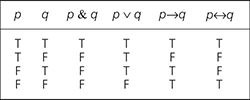Where is a set of truth values, a function mapping -tuples in to values in . In semantics with logical matrices, each -ary connective is interpreted by an -ary truth function .
A truth function of a number of propositions or sentences is a function of them that has a definite truth-value, dependent only on the truth-values of the constituents. Thus (p & q) is a combination whose truth-value is true when p is true and q is true, and false otherwise. ¬p is a truth function of p, false when p is true and true when p is false. The way in which the value of the whole is determined by the combinations of values of constituents is presented in a truth table.

The propositional calculus is the standard treatment of truth-functional combinations. Its constants, &, ∨, ¬, → and ↔, are all truth functors, i.e. expressions standing for truth functions.
- dauphin
- Dausset, Jean
- David (962)
- Davida
- David Dunlap Observatory
- David I (1084–1153)
- David II (1324–71)
- Davidson, Donald Herbert (1917–2003)
- David, St (6th century)
- Davis, George Edward (1850–1906)
- Davisian cycle
- Davis, Jefferson (1808–89)
- Davis, (Nancy) Jan (1953– )
- Davis, Raymond
- Davis, Raymond, Jr (1914–2006)
- Davisson, Clinton Joseph
- Davisson-Germer experiment
- Davisson–Germer experiment
- Davis, William Morris
- Davis, William Morris (1850–1934)
- Davitt, Michael (1846–1906)
- Davout, Louis Nicolas, Duke of Auerstädt (1770–1823)
- Davy lamp
- Davy, Sir Humphry
- Davy, Sir Humphry (1778–1829)